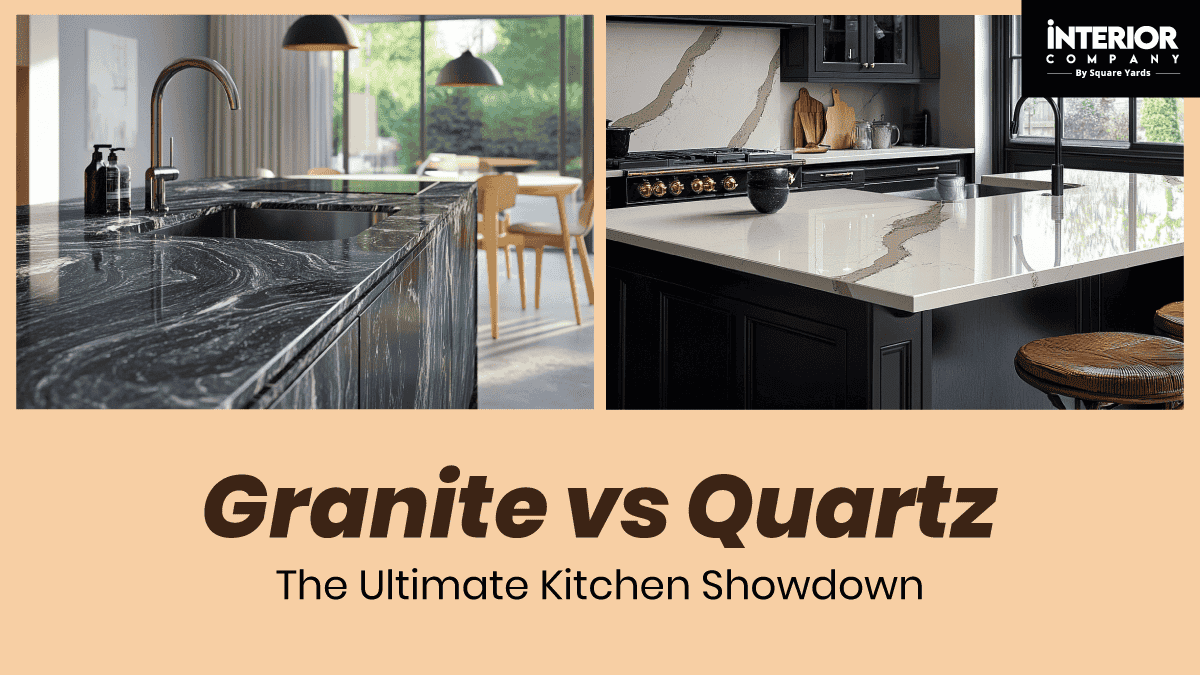Granite, a natural stone, is known for its unique patterns and durability but requires regular sealing for maintenance. On the other hand, Quartz, which is man-made, offers a consistent appearance and is virtually maintenance-free, though it can be a bit pricier.
In the end, the decision between granite and quartz depends on your priorities. Whether cost, maintenance, or style, both materials deliver on aesthetics and durability, so it’s about what best fits your needs.
This blog explores the ultimate kitchen countertop debate-Quartz vs. Granite-and which material is more cost-effective. From initial pricing and installation to long-term maintenance and potential resale value, we will cover every aspect you need to consider before making this decision.
Understanding Granite: The Natural Stone Option
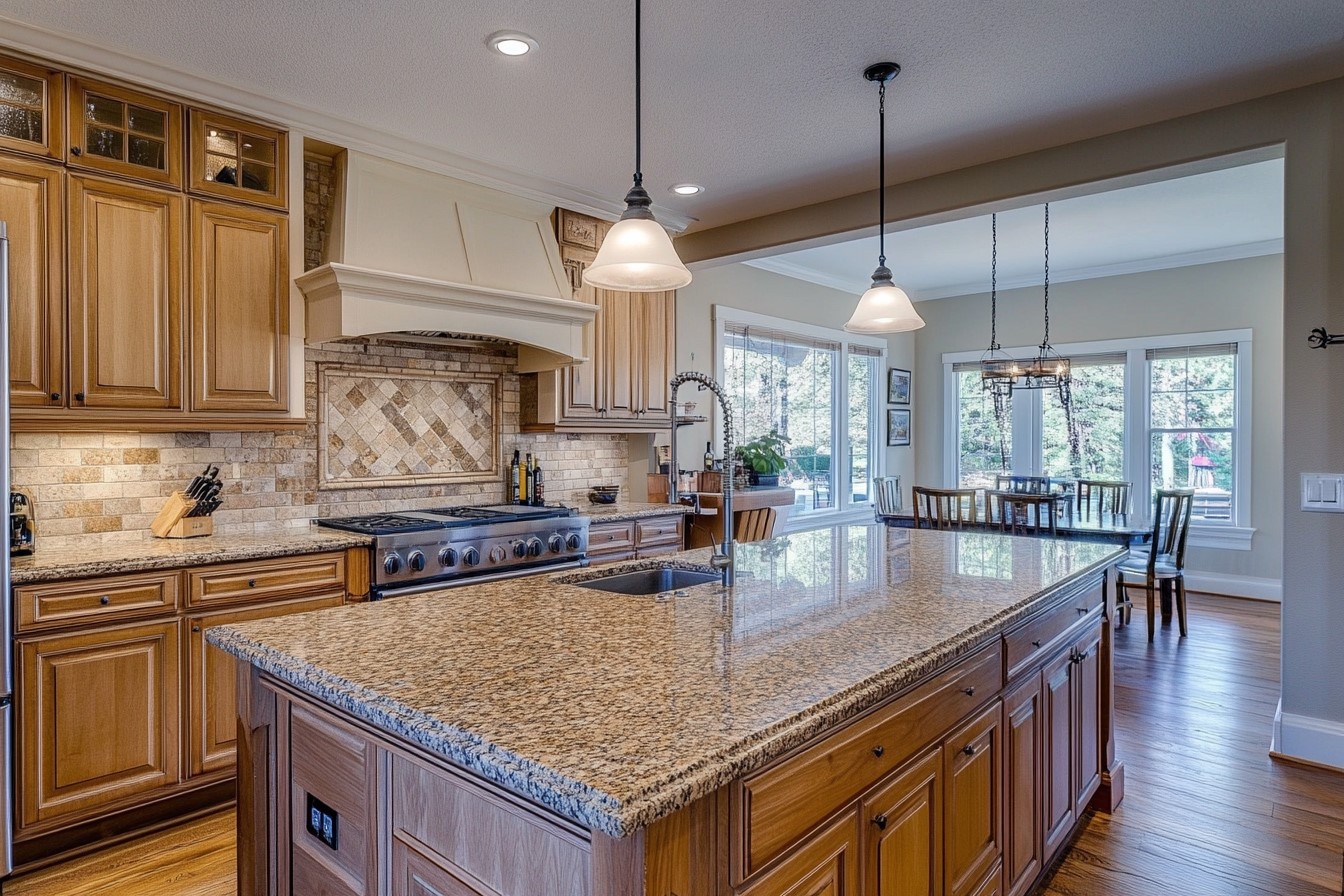
Granite is a naturally occurring igneous rock formed beneath the Earth’s surface through the slow crystallisation of molten magma. Recognised for its distinct light-coloured appearance, it features large, visible grains that contribute to its unique texture. This rock is primarily made up of quartz and feldspar, with its colour ranging from red, pink, and grey to white, depending on the presence of various minerals. These dark mineral grains scattered throughout the stone add to its visual appeal. The price of granite countertops can vary significantly based on the type of granite and the specific preferences of the buyer, offering a wide range of options to suit different tastes and budgets.
Pros and Cons of Granite
|
ADVANTAGES |
DISADVANTAGES |
|
Highly durable and long-lasting |
It is expensive compared to other countertop materials |
|
Resistant to heat and scratches |
Requires periodic sealing to maintain resistance to stains |
|
Available in a variety of colours and patterns |
Heavy and requires professional installation. |
|
Low maintenance with proper sealing |
It can chip or crack if subjected to heavy impact |
|
It is UV-resistant and suitable for outdoor use without fading |
Finding granite without swirls or patterns is quite rare. |
Understanding Quartz
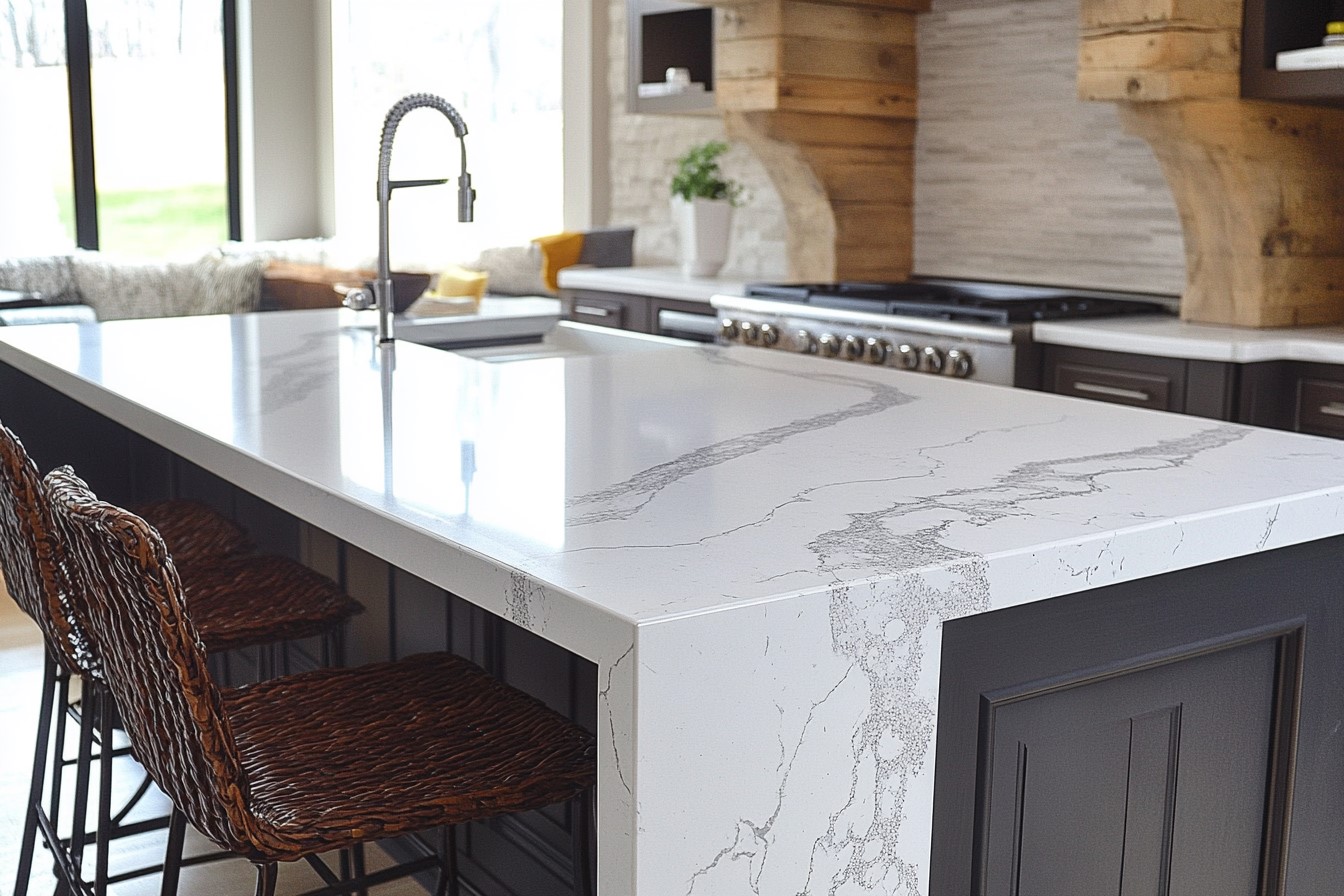
Quartz, a natural mineral, is transformed into an engineered stone known for its strength and durability. Engineered quartz comprises approximately 97% crushed quartz crystals blended with 3% resins, creating a strong, long-lasting surface. Available in a wide range of colours, patterns, and textures, quartz offers a versatile option for various design preferences. For those opting for a more quirky look, quartz can be combined with glass or other reflective materials, producing a brilliant, sparkling finish. As one of the hardest minerals found in nature, quartz provides a highly durable and resilient solution, making it an excellent choice for home interiors. Its toughness ensures it can withstand daily wear while maintaining its elegance, making it a favoured material in modern homes.
Pros and Cons of Quartz
When choosing between granite and quartz countertops, it is important to understand the unique benefits and drawbacks of each. Both materials offer durability and style, but their maintenance, cost, and appearance differences may influence your decision.
|
ADVANTAGES |
DISADVANTAGES |
|
Quartz offers a wider variety of colours and textures compared to granite. |
Quartz countertops are generally more expensive than granite. |
|
Quartz makes pattern mixing easy due to its smooth and plain surface options. |
Quartz is unsuitable for outdoor use, unlike granite, as it fades under harsh weather conditions. |
|
This stone is low-maintenance and resistant to stains. |
Quartz must have the natural beauty of other stones since it is engineered. |
|
Quartz is heavier than granite and highly resistant to cracking. |
Each slab of quartz in the same colour tends to appear identical, lacking uniqueness. |
Key Differences Between Quartz and Granite Countertops
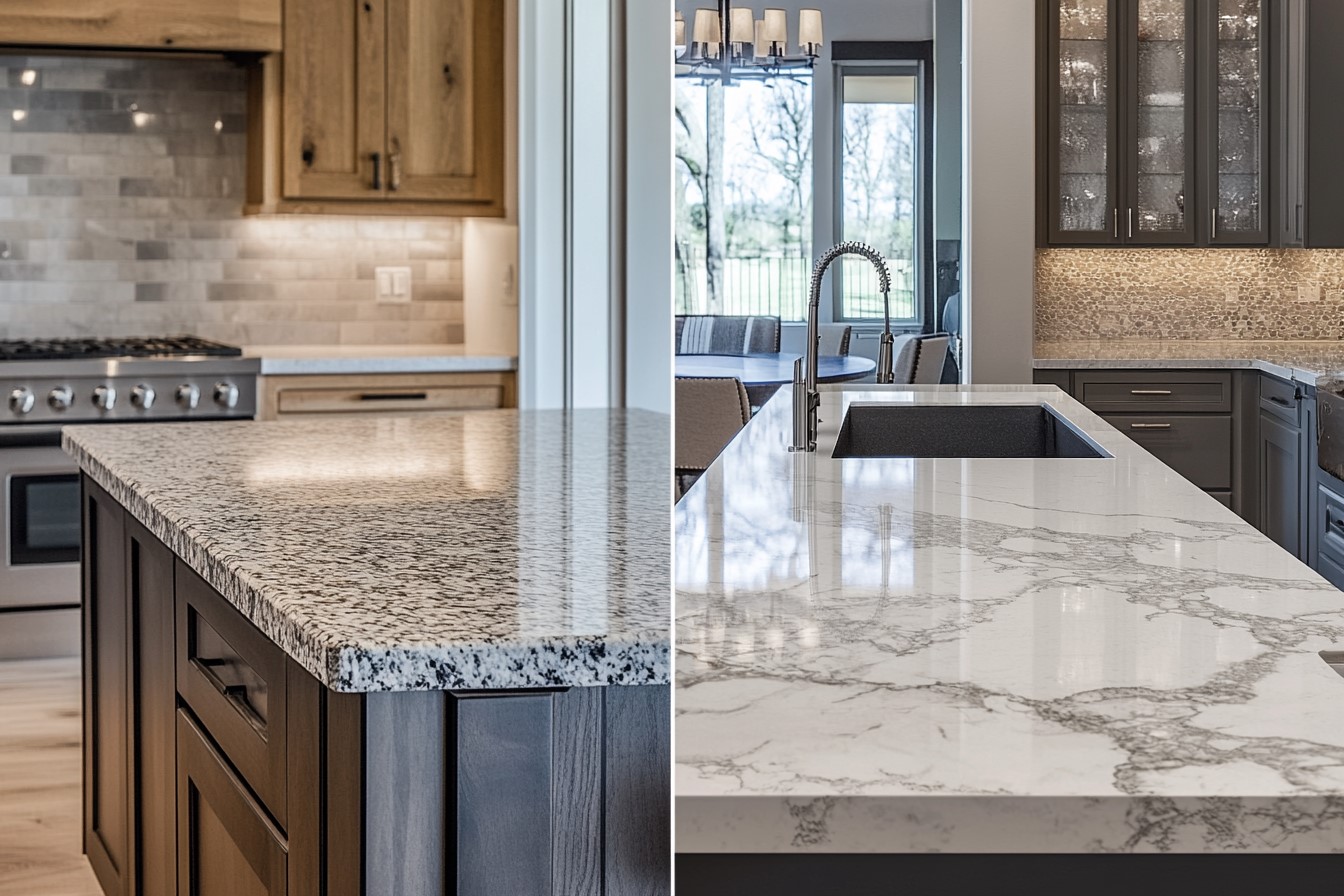
Granite and quartz, both popular kitchen countertops, offer unique advantages and disadvantages. Let’s explore the key differences that can help you decide which material best suits your needs and preferences.
Aesthetics & Appearance
Granite offers a diverse palette of colours, from subtle earth tones to bold shades of green and blue. Finding the perfect slab that complements your kitchen’s colour scheme may require some searching.
On the other hand, quartz is engineered with added pigments, resulting in a broader selection of colours and more uniformity in appearance, simplifying the selection process. These qualities can also influence the cost of quartz kitchen countertops.
Eco-Friendliness
Quartz, being sourced locally in many cases, can be more eco-friendly. In contrast, granite is usually imported from distant quarries, often from other countries, which can increase its cost per square foot due to transportation.
However, granite is a natural material without the addition of synthetic resins, which might make it a greener option. Quartz, on the other hand, is manufactured using chemical resins. Both kitchen quartz and granite worktops have their environmental pros and cons, and the debate is still ongoing, with no definitive conclusion reached yet.
Composition
Quartz and granite are popular countertop materials with unique qualities. Quartz countertops are engineered, consisting of 93% to 95% crushed quartz mixed with resin, offering a durable, non-porous surface that can be customised.
Granite countertops, made from 100% natural stone, require less processing and are often more affordable. In the quartz vs granite debate, granite offers a natural stone look at a lower cost, while quartz provides a more uniform, low-maintenance option.
Maintenance & Hygiene
Granite countertops are easy to clean but prone to staining if improperly maintained. Due to their porous nature, regular care, including annual resealing, is essential to prevent damage and bacterial absorption. This is especially important when considering quartz vs. granite for Indian kitchens, where frequent cooking can lead to spills and stains.
On the other hand, quartz countertops offer a more low-maintenance option. As a non-porous surface, quartz does not require sealing, making it more resistant to stains and bacteria. Its solid structure ensures that dirt and germs can’t penetrate, making quartz a more hygienic and durable choice for easier maintenance and long-lasting performance. When debating quartz vs granite for your kitchen, quartz stands out as a cleaner and more practical option, especially in busy kitchens.
Strength and Durability
Granite countertops are heat-resistant and durable but require sealing to prevent spill damage due to their porous nature.
Quartz, being non-porous, resists stains and scratches better and is more durable than granite. However, it’s still sensitive to excessive heat, so heating pads or trivets are recommended.
Cost Comparison
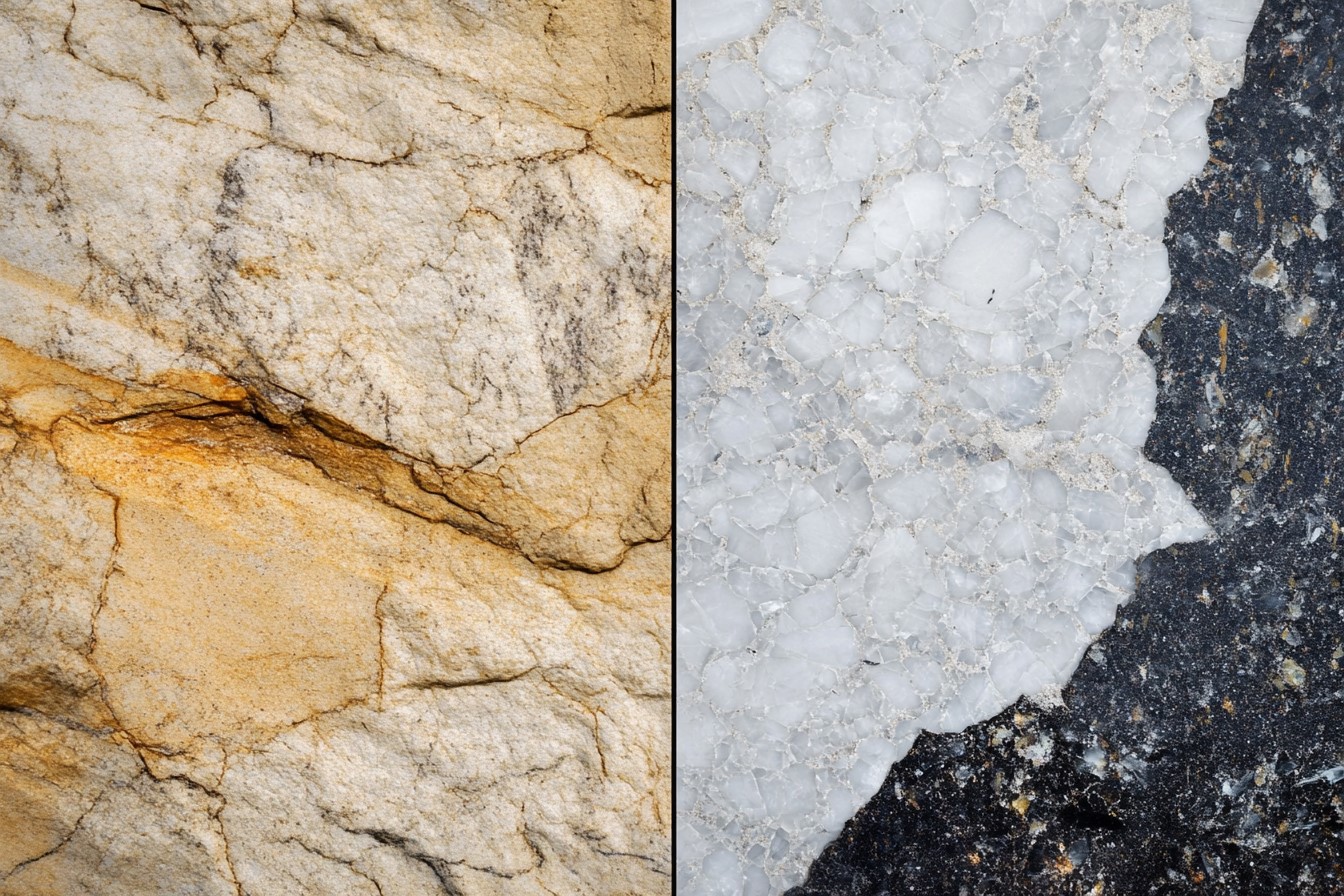
Now, let’s compare the granite and quartz prices for countertops. Quartz countertops, being a man-made product, are generally more expensive due to the manufacturing process. Since the manufacturer determines the price, quartz can significantly increase the overall cost of a kitchen renovation. On average, quartz countertops range from ₹120 to ₹150 per square foot, depending on the quality and brand. In contrast, granite countertops often have a broader price range, making the price comparison granite vs quartz important when considering your budget.
On the contrary, granite countertops are slightly more affordable, typically priced between ₹100 and ₹130 per square foot. However, the cost of granite can fluctuate based on factors such as the complexity of extraction, availability, and transportation expenses. Additionally, certain high-end granite types may increase the cost further, making the price difference between quartz and granite less significant in some cases.
Overall, while granite may initially be more budget-friendly, both materials offer durability and style, and the final cost depends on various factors, including installation and availability.
Grades and Quality Standards
When choosing a kitchen countertop, quality matters. Granite is categorised into three grades: Grade 1 for simpler, lower-quality stone and Grade 3+ for the most durable and aesthetically appealing options.
Quartz follows a similar grading system. The highest grade offers smooth, uniform surfaces ideal for premium countertops, while lower grades may lack durability and are less suitable for busy kitchens.
Granite and quartz come in varying quality levels, so it’s important to choose the grade that best suits your kitchen’s needs and desired durability.
Which Is More Prone to Accidents: Granite or Quartz?
Granite and quartz kitchen countertops are strong, but they handle damage differently. Granite is highly durable, resisting cuts and minor impacts, though heavy items may cause chips, which are often easy to repair.
On the other hand, although sturdy, quartz is held together by resin, making it more susceptible to scratches. Additionally, placing hot pots or pans directly on a quartz surface can damage it, as the resin may react to the heat, causing scratches or discolouration. This makes quartz more delicate when exposed to high heat or sharp objects than granite.
The Verdict: Granite or Quartz?
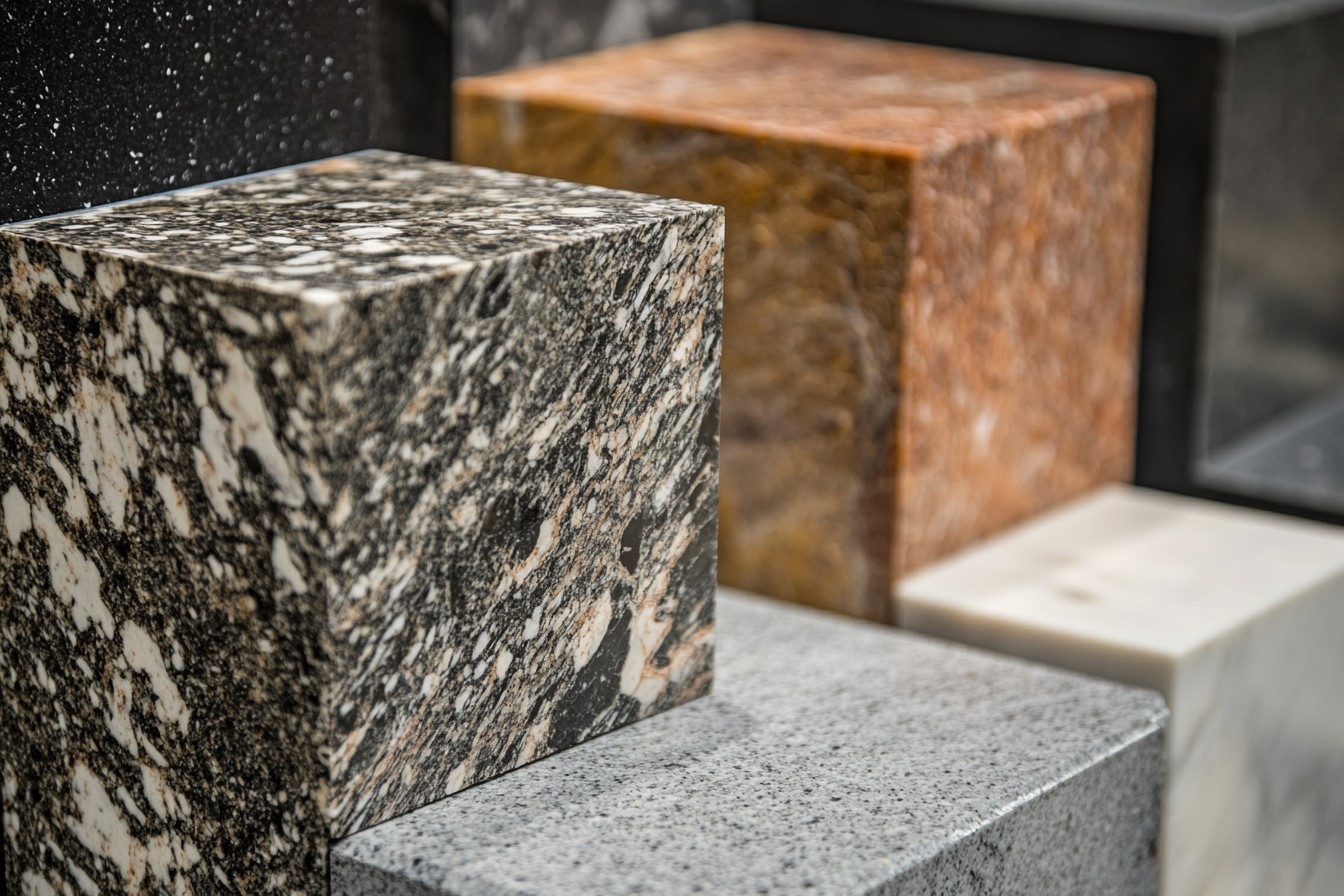
So, which should you choose, granite or quartz? Granite is an excellent option if you appreciate stone’s unique, natural beauty and inherent imperfections. Each slab of granite has its distinctive character, making your countertop one-of-a-kind.
However, quartz is the way to go if you are after a sleek, flawless look with consistent patterns. Quartz provides a more uniform appearance, with no natural striations, making it ideal for a clean and polished look.
Your decision should be based on your personal preferences, budget, and design goals. Granite and quartz elevate the elegance and depth of any kitchen space, offering durability and luxury. They are both long-lasting investments that bring style and functionality to your countertops. The right choice depends on which material best aligns with your needs, ensuring your kitchen achieves the desired aesthetic and performance.
Are you deciding between granite and quartz for your kitchen? Interior Company can help you make the perfect choice. Whether you prefer the natural charm of granite or the sleek look of quartz, we offer expert solutions that balance style, durability, and budget. Transform your kitchen with Interior Company—where design meets affordability.
*Images used are for representational purposes only. Unless explicitly mentioned, Interior Company does not hold any copyright to the images.*
